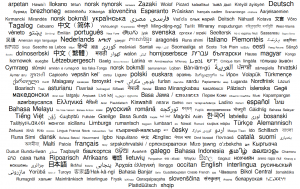By Sarah-Claire Jordan
 This is an extremely touchy subject for all linguists. There are tons of theories, but, with the number of languages spoken in the world, they probably don’t all share the same universals. A good amount of them may, however, so it is still worth checking out. Those linguists that have taken it upon themselves to try and uncover these “universals” have come up with some very interesting ideas about what they could be.
This is an extremely touchy subject for all linguists. There are tons of theories, but, with the number of languages spoken in the world, they probably don’t all share the same universals. A good amount of them may, however, so it is still worth checking out. Those linguists that have taken it upon themselves to try and uncover these “universals” have come up with some very interesting ideas about what they could be.
First of all, it is important to note that linguistic universals fall into either one of two general categories. The are either absolute, or implicational. An absolute linguistic universal is one that can be applied, and applies to, every language in existence. An implicational linguistic universal only applies when a language has a certain feature that is always associated with another feature as well.
An example of an absolute linguistic universal would be that “all languages have verbs”. An implicational linguistic universal, for example, is “if a language has voiced stops, then it also has the correlating unvoiced stops.” There are also “tendencies”, which are just like universals but only apply to most languages rather than all languages. They, too, can be organized based on whether they are absolute or implicational.
Moving back to universals, it should be noted that they can be further categorized. Bidirectional and unidirectional are some other categorizing labels besides absolute and implicational. Bidirectional universals are universals where, if a language has one certain feature, it implies the presence of another feature. Unidirectional is just the opposite of that, and would be the same as a normal absolute universal in that they describe a single linguistic feature that doesn’t influence other features.
Some linguists say that all of the universals that apply to syntax, or the rules of a language regarding sentence and phrase structure, can be used as a sort of evidence that proves the existence of Noam Chomsky’s theory of Universal Grammar. This theory, at its heart, claims that the ability to learn and understand grammar is something all humans are born with. The universals regarding syntax may very well be proof of this, but it is still being debated, especially since the birth of new linguistic theories and schools of thought.
All of this is to say that yes, there are things that all languages have in common, due to the mere existence of linguistic universals. If they were not called universals, and instead were all just tendencies, no one could claim that every language has anything in common, only that many do. That probably wouldn’t be very useful for linguistic research and discussions in general about linguistic development in humans and other related topics.
Something that all languages have in common is that they allow us to all communicate with each other and all have grammar. Some might claim that all languages have phonemes, or the smallest units of sound that a language can be broken down into, but this wouldn’t be true if you consider all of the sign languages used in the world. On top of that, there are always new languages, and people, being discovered, and we can’t know for sure if they share these universals until we take time to study them. Basically, all languages have grammar and let us communicate, but if you want to exclude sign languages, you could add quite a few more universals to the list.
For an overview of our translation expertise, visit our financial translation page



